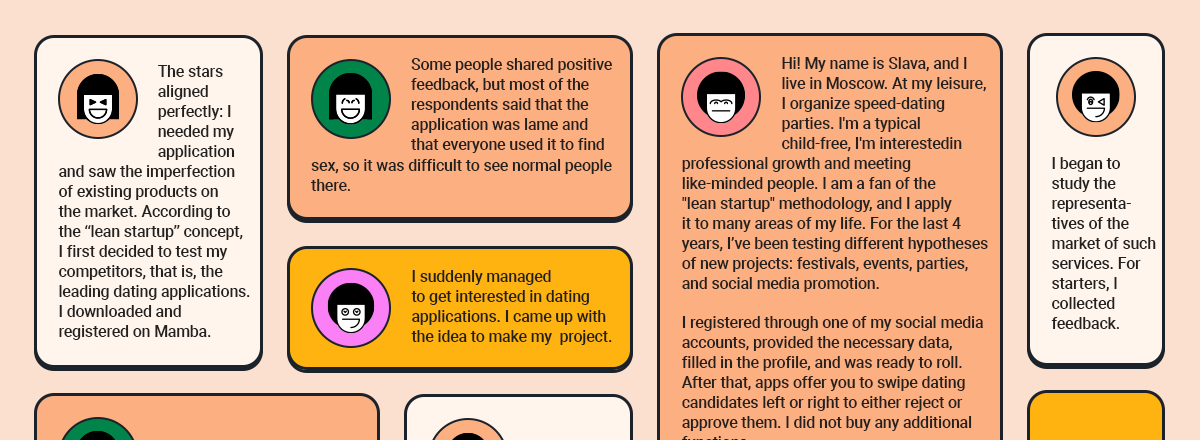This text is a translation of an article by a Russian startupper.
Hi! My name is Slava, and I live in Moscow. At my leisure, I organize speed-dating parties. I'm a typical child-free, I'm interested in professional growth and meeting like-minded people. I am a fan of the "lean startup" methodology, and I apply it to many areas of my life. For the last 4 years, I’ve been testing different hypotheses of new projects: festivals, events, parties, and social media promotion. Before that, I worked on startups Getcity.com and Dostavista.ru. And then I suddenly managed to get interested in dating applications.
This summer, I came up with the idea to make my own dating project in the form of an app. I began to study the representatives of the market of such services. For starters, I collected feedback from friends about the market leaders: Badoo and Tinder. Some people shared positive feedback, but most of the respondents said that the apps were lame and that everyone used them to find sex, so it was difficult to see normal people there.
Personally, for me meeting people for love, sex, or relationships through the app is weird. Perhaps it is because of my active social life, or maybe, other people find such apps convenient. But I cannot even imagine myself looking for love on Mamba or LovePlanet.
As it usually happens with good ideas, mine came suddenly.
The stars aligned perfectly: I needed my own application and saw the imperfection of existing products on the market. According to the “lean startup” concept, I first decided to test my competitors, that is, the leading dating applications. I downloaded and registered on Mamba, Tinder, Badoo, Bumble, Huggle, LovePlanet, and a few less significant ones.
The task that I set for myself was to meet and talk to girls with both interesting appearance and line of work. I did not have any unrealistic expectations. I call such meetings "live communication therapy." Communication with new enthusiastic people gives us, the residents of a big city, energy.
Tinder and Badoo turned out to be the best in terms of functionality.
I registered through one of my social media accounts, provided the necessary data, filled in the profile, and was ready to roll. After that, apps offer you to swipe dating candidates left or right to either reject or approve them. I did not buy any additional functions.
For a whole week, I spent about 1-2 hours every day to find an interesting person to meet. My task was to find a pretty girl aged 24-28 years (I am 28), who has interests more or less similar to mine (or at least not the opposite). In my profile, I indicated that I wish to meet to find a friendship based on similar interests and to communicate in real life. I also indicated that I am a blogger.
As a result, no girl I liked approved the contact. It’s either I am crazy, or the world is crazy. Perhaps, there is too much competition for girls in the app, I read about it. Or maybe it’s paid functions. Perhaps you need to show signs of wealth in the photo. I do not know.
Bumble and Huggle.
I liked these apps the most. They are user-friendly with pleasant structure and design. I found the people there more respectable and creative. As far as I understood, Bumble and Huggle have fewer users than leading apps, but the quality of traffic is much higher. The quality of users' photos, description, and bio in the profiles are at a high level.
But again, the problem is that you need to choose the interlocutor by swiping. The app itself decided who to show me. Perhaps, like Tinder, the service analyzed my interests on Facebook, but it feels like I was offered to communicate with random people. Of course, I was able to regulate the remoteness of the people I wanted to meet. There are minimal filters: gender, age, friendship/love, remoteness.
And Huggle is a social app, which connects users based on the commonality of places they often visit. But I did not feel the use of this feature. When the application informed me that I came across someone in a certain place, I was already leaving. And what does the information that I was in the same shopping center with this person give me? By the way, Badoo has the same function.
My conclusions:
- In existing apps, people get to know each other more for sex, love, relationships.
- Swiping candidates kills the desire to find a person because of irrelevant incoming traffic and faulty filters.
- You can’t look at users on the map.
- There’s no indicator that the message has been read and that likes have been received.
- You can’t indicate many interests and find people by them.
Inspired by the test, I applied to the pre-accelerator with the idea of a ZenDate dating app based on interests. After 30 minutes of consultation, a specialist concluded that my idea is interesting, but I have no team and no technical specialist. The idea of my dating app is only a month, but I have already received a lot of feedback that such a tool is necessary for a city dweller.













